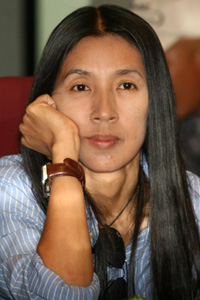It seems there are fewer ammart military officers in the army these days. However, this does not necessarily mean these officers have switched loyalty to former prime minister Thaksin Shinawatra.

While the wives of many soldiers are known to be red-shirt supporters, officers are increasingly choosing neutrality to avoid trouble in case of political strife. CHANAT KATANYU
In fact, it's the political climate that has made many army officers choose political neutrality, reserving their loyalty instead for the monarchy.
Over the past few years, the army has been greatly affected by the colour-coded political divide. After the Sept 19 coup that ousted Thaksin in 2006, followed by the crackdown on the red-shirt protesters in 2010, the army _ especially those at the commander- and commissioned-level - were regarded as supporters of the yellow-shirt faction and ammart clique.
After the 2006 coup, the commanders were dominated by those close to the ammart group as well as the so-called Burapa Payak or "Tigers of the East" camp under then-defence minister Gen Prawit Wongsuwon. Then army chief Gen Anupong Paochinda took a firm grip and this group's power in the army was solid until recent shifts in the political situation.
Today, most of the army commanders are not the extreme "yellow" like the People's Alliance for Democracy (PAD) or the multi-coloured faction, nor are they inclined toward the Democrat Party. They simply don't side themselves with the Thaksin regime and there is no question that they are royalists.
But the non-commissioned officers, who have a larger base in the army, and their families appear to favour Thaksin and his sister Prime Minister Yingluck who please them with populist policies like the first-car buyer scheme.
This helped Pheu Thai romp to victory in the last election despite the discreet order that they should not pick the people who "burned down the city" _ a phrase referring to red-shirt leaders and their roles in the Bangkok violence in 2010. The officers had to obey their wives and families, not their bosses who dared not make any open move for fear that their order would be revealed through ubiquitous video clips.
Hence, the popular phrase that the officers are "afraid of wives, not commanders". It is known that a large number of army wives are red-shirt supporters. Some are even Pheu Thai canvassers.
Yet observers say there are some welcome changes in the army. One important change is that a large number of mid-level officers seem to be choosing professional paths, keeping a distance from all colours, while at the same time maintaining loyalty to the monarchy.
Though their image is still that of red-shirt sympathisers, these officers, from mid-level up to the top, simply stay away from Thaksin. It seems they have learned some lessons and want to avoid trouble as a result of political strife.
Take current army commander Prayuth Chan-ocha, for example. His firm "no" to the calls for a coup makes him look closer to the red shirts.
But he strongly denies this is the case.
"I have never changed. I am for every side, the government or the opposition," the army chief said. "I am the people's servant. The army is for the nation, religion, the monarchy and the people." He also makes his "for-the-monarchy-only" position clear to his subordinates.
The army chief, who normally insulates the army from political interference, seems to have softened his stance a bit, especially when he was dealing with Defence Minister ACM Sukumpol Suwanatat, Thaksin's classmate at the Armed Forces Academies Preparatory School. During the controversial military reshuffle, he made a compromise by approving the promotion of Gen Tanongsak Apirakyothin to the position of permanent secretary of the defence, and some other positions that were deemed appropriate.
Not only did Gen Prayuth ignore the call for army intervention in politics, as made by Gen Boonlert Kaewprasit, the former leader of the Pitak Siam group, he also prohibits army officers from attending political demonstrations.
This shift toward professionalism is more than welcome for the army.
Wassana Nanuam is a senior news reporter covering military affairs for the Bangkok Post.
